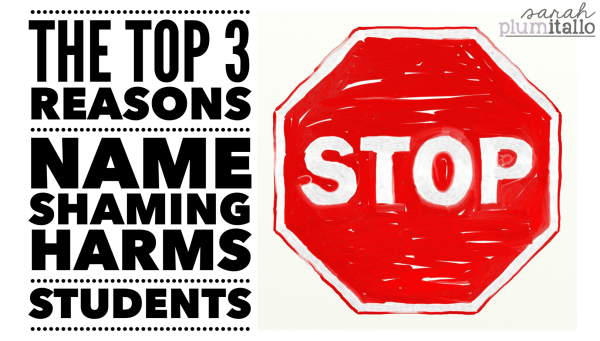
Each year, usually in the back-to-school season, I see a trend on social media. I’ve heard it in conversations in the teacher’s lounge and even in the Dollar Spot aisles at Target. I’d wager a guess that you’ve heard it too at some point.
It’s name-shaming.
I’ve written about it before (The Top 3 Reasons Name Shaming Harms Students) and spoken about it on my social media accounts (such as this video). I’m not satisfied, though, with just talking about it… I want to DO something about it. I decided that this back-to-school season is a perfect time to launch a simple, yet important challenge that absolutely anyone – in anyone school! – can do.
Meet the My Name Matters challenge.
 Our challenge goal? To end name-shaming in any of our spaces – whether it’s in our schools, homes, or on social media.
Our challenge goal? To end name-shaming in any of our spaces – whether it’s in our schools, homes, or on social media.
The challenge has two steps:
- Honor your students’ names by learning to pronounce and spell them correctly.
- Take steps to eliminate name shaming in your own communities by speaking out.
I, of course, want to provide you with tools to be successful in this challenge! I have some suggestions and thoughts about how to work through each of the two steps below.
Honor your students’ names.
 It is so important that we honor our students’ names by pronouncing and spelling them correctly. There is an article published by NEAToday that discusses the lasting impact of mispronouncing students’ names, as well as this must-read from Cult of Pedagogy.
It is so important that we honor our students’ names by pronouncing and spelling them correctly. There is an article published by NEAToday that discusses the lasting impact of mispronouncing students’ names, as well as this must-read from Cult of Pedagogy.
It’s important… we want to do it… but how?
You’ll want to begin by getting your class lists and identifying any names that you’re not certain of pronunciation. This may be names that have multiple pronunciations, or names that you are not at all familiar with. Next you can:
- Make contact with the students’ family, introducing yourself, welcoming them to the classroom community, and inquiring as to how they pronounce the student’s name at home. You may want to explain that the purpose of your phone call is to make sure your student feels welcome and valued by you pronouncing their name correctly.
- If you’re not comfortable with asking a students’ family how to pronounce their name ahead of time, be sure and ask the student how to pronounce their name upon meeting them. Be sure and repeat the name back, checking it against their own pronunciation – you may not get it right the first time, but you will get it right with practice!
- Contact previous teachers and ask how they pronounced the students’ name and compare notes – this is a good stop-gap measure if you’re unable to contact the family and want to try to pronounce the students’ name correctly prior to meeting them. Err on the side of caution, though, as your colleagues may not necessarily be pronouncing it correctly themselves!
Remember: keep at it until you get it right, and if you make a mistake – apologize! Make sure your students know that it is important to you to honor their names and that you’ll keep at it until you do.
Don’t be a bystander.
 The saying goes: when we know better, we do better. We know name shaming is wrong, so we’re going to stop doing it ourselves. But… can’t we strive for more? I think we can, and I want to end name shaming TOGETHER.
The saying goes: when we know better, we do better. We know name shaming is wrong, so we’re going to stop doing it ourselves. But… can’t we strive for more? I think we can, and I want to end name shaming TOGETHER.
So don’t be a bystander! If you hear or read someone that’s participating in name shaming, say something.
Confrontation and disagreement can be difficult and certainly uncomfortable, but we can’t accomplish our goal of ending name shaming without doing the difficult work. Here are some suggestions for conversation starters/responses when you encounter name shaming:
- “I know ________ may not be a name you’re familiar with or would name your own child, but I bet ________’s family really like that name. I know I would feel hurt if someone criticized my name or my child’s.”
- “I don’t think it’s right to judge ________’s name. Names are personal…. ________’s name means something to him/her and their family. When we make fun of it, we make fun of them. That’s not something we should do.”
- “It might be difficult to pronounce ________’s name, but I can’t imagine what it must feel like to constantly be called by a nickname you didn’t choose or have your name mispronounced. Have you thought about writing down the phonetic spelling and practicing it?”
It begins with us.
Name shaming is one of many issue facing our students today. Ending it begins with you (and I!) deciding not to accept it in our spaces. It’s one small, necessary step we can all take to dismantle inequities facing our most vulnerable student populations; each step we take propels us forward with increasing momentum.














